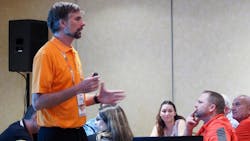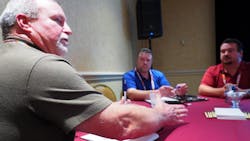Give some thanks for drivers: How fleets get and keep the best
In Livonia, MI, there's a fleet that believes holding onto good truck drivers in today's extremely competitive environment takes more than you can learn in Management 101 or even show on a pay stub. It's a better life and something you just can't fake: heart.
Fleet managers and leaders attended a roundtable session and, assembled into small groups, talked about what they've found works in driver recruitment and retention. One of them, Scott Simpson, Sr. — who's president and CEO of Ryan Transportation and whose "big kid" demeanor might prompt a double-take or two — noted that the pay at this or that trucking company tends to work out relatively even.
"Everybody goes out there and they paint the cow a different color," he quipped. Companies may pay more per mile or give out various bonuses, "but at the end of the day, this guy's making 60 grand, this guy's making 60 grand; they're just all making it in different ways.
"So I think that pay, although important, is not the biggest drawing factor for a driver," Simpson contended.
It was in Nashville, TN, at PeopleNet and TMW Systems' first joint in.sight conference. Scott Groff, director of operations training at PeopleNet, got things started noting that many trucking companies cite pay, benefits and home time as top factors in attracting talent. Over at Simpson's table, they tossed around pay and benefits, but soon focused more on that third one.
"I think right now, out of those three things, home time seems to rank pretty high," said Rick Harpool, a driver manager at automobile hauler Centurion Auto Transport. Taking it further, Harpool added that a fourth factor in attracting drivers "is the experience they have at work."
Simpson agreed, arguing that over his more than three decades in trucking, the market has changed. "The driver who used to get in a truck and say, 'I'll see you next month' — that quintessential truck driver — doesn't exist anymore," he said. "Drivers today are family guys; they're interactive with their kids. They're looking for a job that gets them home."
Adjusting
A different market may mean trucking businesses need change. With "the breed" of truck drivers perhaps evolving as Simpson suggested, as well as the nation's shift more toward hub-and-spoke distribution models, Ryan Transportation has gone through a metamorphosis of its own.
If you draw a circle with a diameter of about 500 mi. around Livonia — which is about midway between Detroit and Ann Arbor — "that's where we operate," Simpson explained. "The thing is, we changed our environment to be that way for the changing driver."
It allows for better work-life balance, he contended, and better rapport with the company's people. In this particular fleet's case, some drivers might be home every night, but more typically it's every two or three. Ryan has nearly quadrupled in the last few years, he noted, going from 47 to 175 trucks.
Personal support
Harpool said that like many fleets, Centurion is prepared to take on new drivers or those inexperienced in its particular business. But just as important as having a training school and resources for that is the continuing support the drivers get.
"Once they come out of our school, they're assigned a driver support team," he said, and that team will follow the drivers throughout their careers at Centurion.
"It's not just six or seven months, eight months, a year," Harpool emphasized. The driver support team, "which is a team of about six of us throughout the company, knows a driver by name," he said. "They know his phone number. When they see him in the hallway when he comes into the terminal or whatever, they go up and ask, 'How's it going?'"
To make a difference, driver support needs to go beyond orientation and checking up, Harpool said — the support team gets to know the driver's spouse and children, for instance. He mentioned one of Centurion's drivers had a daughter born earlier this year and had texted Harpool her name.
"You remember the daughter's name, and next time you see him, you ask how she's doing," he said. "It's those little things that make it more personal, make it more one-on-one, instead of, 'Hey, go out there and get this load, get it gone and get it delivered.'"
Family experience
One thing that's sure to send drivers packing, according to Simpson, is anonymity. Ryan Transportation has parking spaces for drivers' trucks, washes trucks for free each weekend, will check out problems with trucks at no cost and does things like hold "drivers' appreciation week" barbeques.
"I know every driver, I know their wives, I know who their kids are," Simpson said, "and so does pretty much everybody." He described a recent get-together: sitting around at tables and grilling burgers, one driver came in with his mother, another with his wife and kids, and for others, it's whatever relatives and close ones and "that whole family dynamic."
"The biggest feedback we got was that when you're here, you're a name. You have an identity. You're not a number," Simpson said. "Drivers are so scarce and they're out there going from place to place to place. They've become a commodity rather than an asset."
That's where a company can stand apart from others. Simpson shared "a great moment" at Ryan Transportation where one of the company's longtime drivers and his wife had always thought of going on the road together. But in the last few years, debilitating Multiple Sclerosis afflicted her and had taken away that possibility.
"She couldn't get in and out of a truck," Simpson noted — but then the company got some new Peterbilt 579s, "and those drive just like a car."
"And we're like, 'Here's what we're gonna do.' We got one of the new Petes, and we brought her over in a wheelchair in the back of my pickup truck," said Simpson. "We backed up to it, and we all got in and put her in that truck for the day.
"We had roses in there for her and this whole setup, and the driver took his wife out with him," he continued. "It was probably one of the greatest moments for me ever in what we do."
More often in trucking, Simpson contended, such a "family environment" has been lost. "But to me, that's the difference; that's how you keep your people," he added. "It's being personal, knowing who they are, talking to them, sharing with them."
The ones that get away
Those kinds of connections with your people may make a difference, but even so, some leave. "Sometimes the drivers will get together, and you can just tell maybe they like some guys more than others," pointed out Stephen Normandin, vice president of strategy at Braun's Express' New England terminal.
"Sometimes even though a guy's doing a really good job, you'll kind of get a feeling like they're not going to stay," he said. Or drivers will be enticed away from one company because of another's sign-on bonus, pay structure, different benefits and so on.
The table of fleet owners and managers suggested, however, that sometimes losing a driver can become an opportunity for the fleet. In an exit interview, let them go — but leave the door open for them to return.
"Those drivers who left you, you may want to call them after a month or two and see how things are going," said Mark Wesley, director of sales and marketing at Ryan Transportation. Transparency and consistency in what your drivers do and maintaining rapport can win them back.
"A lot of times, our biggest success is a driver who left but turned around and said, 'The grass isn't greener over there — I thought it was,' but then they came back," noted Simpson.
Amid the discussions of the driver-company relationship, PeopleNet's Groff quoted the late Peter Drucker's writings on management. "He once wrote, 'All organizations now say routinely, "People are our greatest asset." Yet few practice what they preach, let alone truly believe it,'" he said.
About the Author
Aaron Marsh
Aaron Marsh is a former senior editor of FleetOwner, who wrote for the publication from 2015 to 2019.



